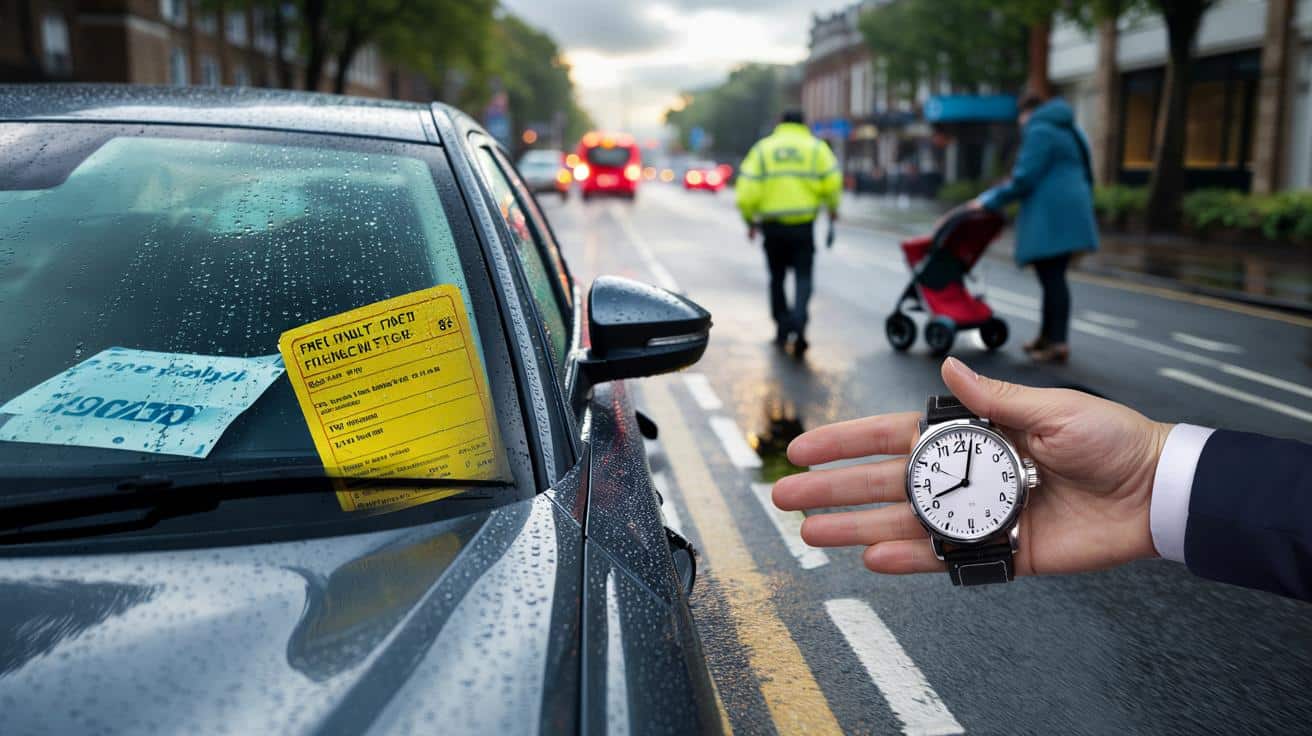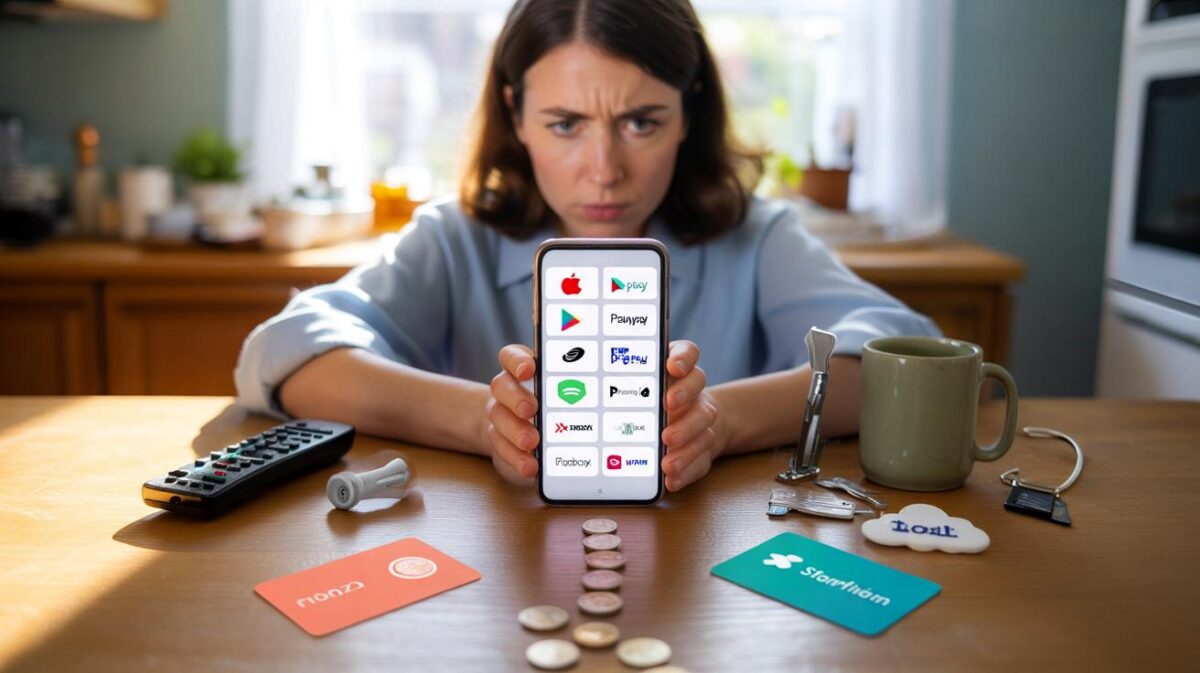Some parking tickets are unavoidable. Others survive on silence and panic. There’s a tiny legal detail that flips the script, and it’s hiding in plain sight on your ticket.
Yellow packet under my wiper, a wet Pay & Display stub on the dash, and that small burn in the chest only a parking fine can give. The meter said 12:00. The “contravention time” on the notice said 12:06. Six minutes. Six. A mum in a blue coat breathed a tired laugh as she loaded a buggy. “They’re like hawks,” she said, not unkindly. I took a photo of the sign, another of the ticket, then another of my watch next to the yellow packet. And I remembered a footnote a lawyer once mentioned at a dinner party. A rule hiding on the back of the rules.
The tiny legal trick: the 10‑minute grace you didn’t know you had
There’s a statutory 10‑minute grace period for many council‑run parking bays in England. In plain words: after your paid or free time runs out in a designated bay, a council can’t slap you with a penalty for ten minutes. It’s not folklore. It’s written into the Civil Enforcement of Parking Contraventions regulations, amended in 2015. It applies to on‑street bays and council car parks where parking is allowed and time‑limited. Not yellow lines. Not red routes. A small protection meant to reflect life: queues, toddlers, rain, reality. If the “contravention time” on your PCN falls inside that window, you have a strong, clean appeal.
Take Matt in Manchester. He fed a meter until 11:30, got waylaid by a courier, and found a PCN timed 11:36. He wrote a short, unfancy challenge quoting the “10‑minute grace period” and attached two photos: his P&D stub and the penalty notice showing times. The council cancelled within a week. No drama. Journalists who file FOI requests see thousands of PCNs dropped each year over timing, signage and paperwork errors. The grace period is the simplest of these wins, because it’s binary. Either the clock says you’re inside ten minutes, or it doesn’t. The trick is knowing it exists.
Here’s how it works. Councils designate parking places by order under the Road Traffic Regulation Act 1984. Where parking is permitted for a time — paid or free — the regulations say a PCN must not be served until ten minutes after that time has expired. That’s the shield. It does not apply to waiting restrictions like double yellows, to suspended bays, to loading bans, or to moving traffic. Private car parks run by supermarkets or retail parks are different. There isn’t a statutory grace, though most accredited operators commit to at least ten minutes at the end of a stay under their codes of practice, and a few minutes to read the signs at the start. The principle is fairness. The application is precise.
What to do the minute you spot a yellow packet
First, breathe. Then flip to the times. Compare your expiry time on the Pay & Display, app receipt or free‑bay limit with the “contravention time” printed on the PCN. Photograph both, ideally together, plus the sign and bay markings. If you’re within ten minutes in a council bay in England, cite the 2015 amendment to the Civil Enforcement of Parking Contraventions (England) General Regulations. Drop in the exact times in one line, attach your photos, and ask for the Civil Enforcement Officer’s notes. Keep it calm and short. The clock is kinder than you think.
Let’s be honest: nobody really prints out statutes at the kerb. Still, a few lines matter. Avoid rants, apologies and long backstories. Don’t say “I was only seven minutes late” without the law that says seven minutes is protected. Some councils re‑offer the 14‑day discount if they reject an early challenge, some don’t. Read your PCN, because it usually says whether the discounted rate will be preserved while they consider an informal appeal. We’ve all had that moment when time gets away from us, but your letter works better as a tiny brief than a diary entry.
“If the times show you’re inside ten minutes in a designated bay, that’s not discretion — that’s compliance. Quote the regulation, show the evidence, and you’ll usually win,” says a motoring solicitor who sees these cases weekly.
Here’s a simple structure that gets read:
- One sentence stating the location, bay type, and both times.
- One sentence invoking the 10‑minute grace period under the 2015 amendment to the General Regulations.
- Two photos: the PCN showing contravention time, and your P&D/app receipt or dashboard clock.
- A request for CEO notes and any photos, plus the Traffic Regulation Order if the bay status is disputed.
- For private tickets, ask for the contract, signage map, and compliance with Protection of Freedoms Act 2012 Schedule 4.
Beyond one ticket: why this small rule changes how you park
The grace period is about more than saving £35 or £70. It’s the feeling that the system remembers you’re human. You get ten minutes because life is messy. Recognising that makes you less likely to gamble on a risky stop or sprint a crossing. It shapes how we all use scarce kerbspace with less aggression. It also nudges councils toward clear signs and proportionate enforcement, because a rule that’s understood is a rule that sticks. Small fairness creates trust, and trust makes streets work.
| Point clé | Détail | Intérêt pour le lecteur |
|---|---|---|
| 10‑minute grace (council bays, England) | No PCN until 10 minutes after paid/free time ends in designated bays | Clear, legal route to cancel if ticketed within the window |
| Not for yellow lines or red routes | Grace doesn’t apply to waiting restrictions, suspensions, bus lanes or moving traffic | Avoids false hope and wasted appeals |
| Private car park nuance | Codes of practice give grace; no statute; different appeal path | Stops you mixing up “fines” and contractual charges |
FAQ :
- Does the 10‑minute rule apply everywhere in the UK?It’s set in law for council‑run bays in England. Many councils elsewhere apply similar grace as policy, but it isn’t the same legal duty. Always check the wording on your PCN and the local authority’s guidance.
- What if the meter clock or my app time looks wrong?Use what you can prove. The PCN shows the CEO’s timestamp; your app receipt or P&D stub shows your expiry. Photograph both. If you suspect a faulty machine, reference that and ask for machine audit logs in your challenge.
- Will I lose the discount if I appeal?Most councils re‑offer the discounted amount if you make an informal challenge within the initial window, but it’s not a legal guarantee. The PCN usually states the policy. Read it before you decide.
- Does the grace cover double yellows or a suspended bay?No. The grace applies only where parking is permitted for a period in a designated bay. Waiting restrictions, suspensions and red routes are different rules with immediate effect.
- What about private parking tickets from supermarkets or retail parks?They’re not “fines”; they’re invoices under contract. Use the operator’s appeal first, then POPLA or the IAS depending on the trade body. Don’t admit who was driving if you’re relying on keeper protections under the Protection of Freedoms Act.








